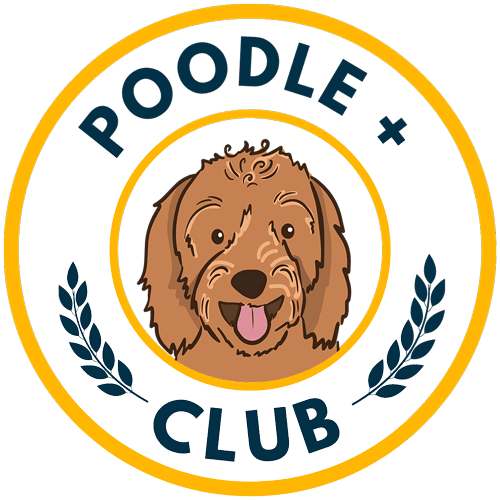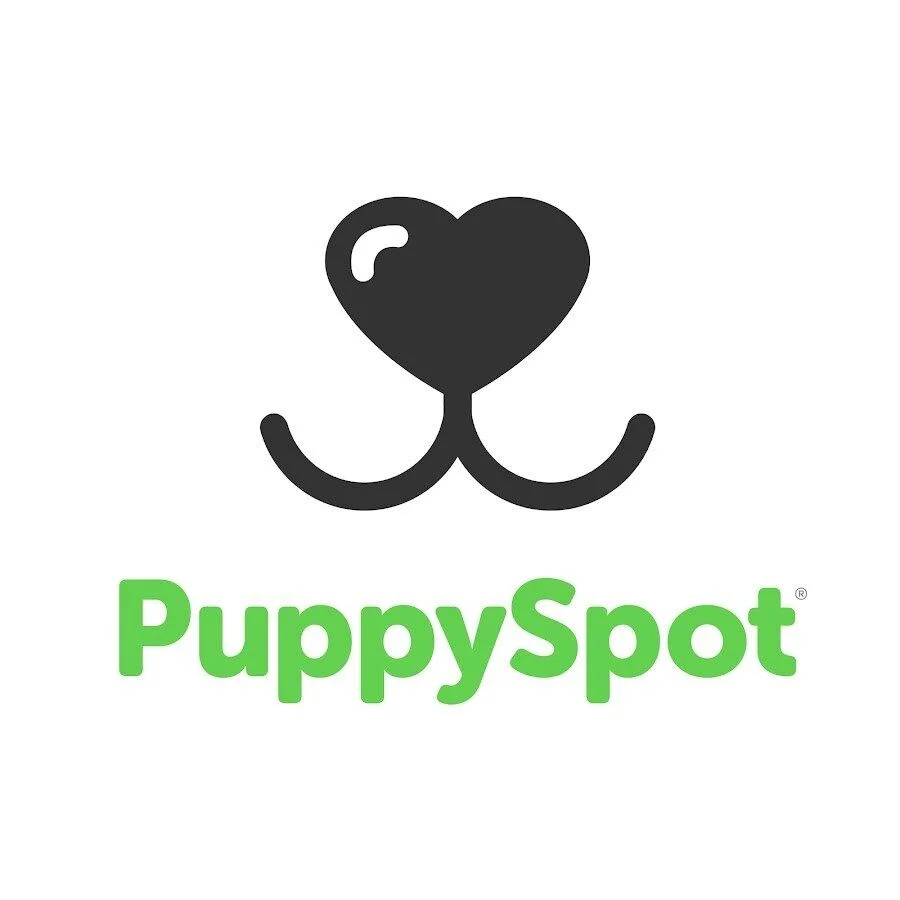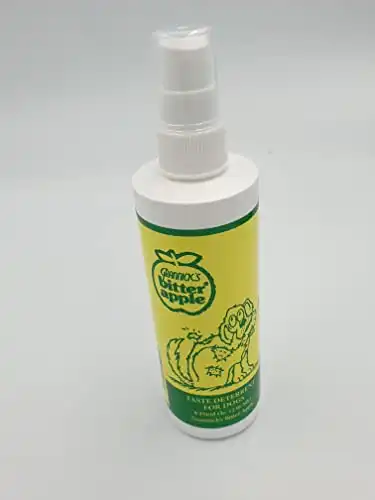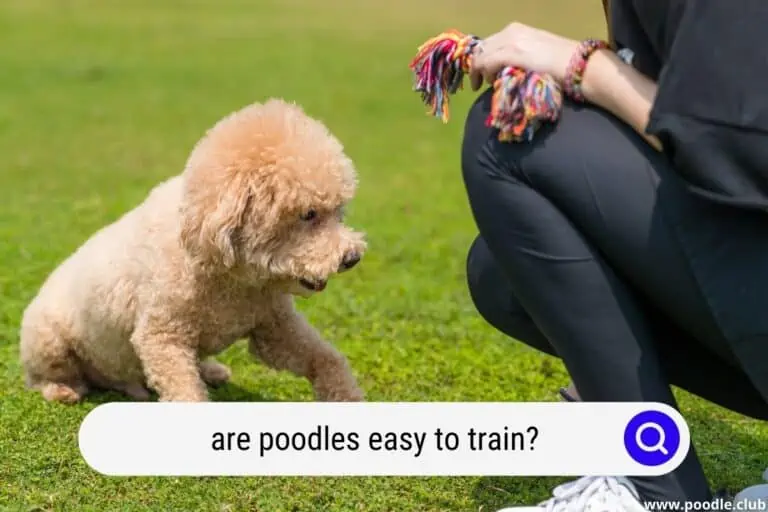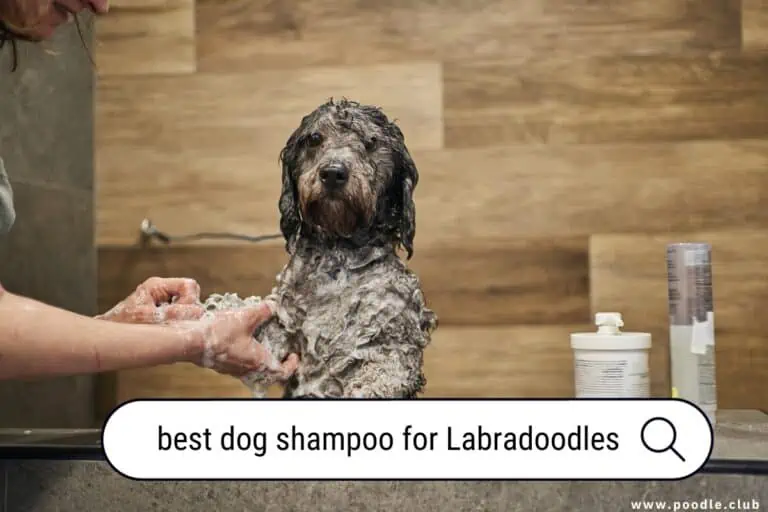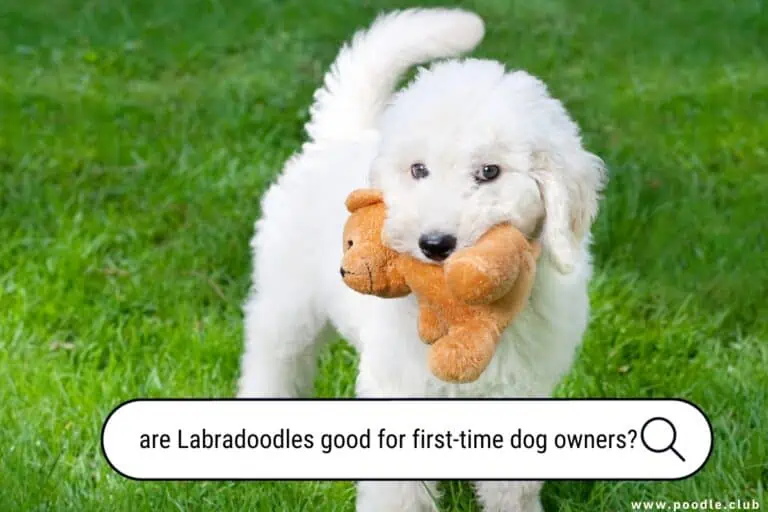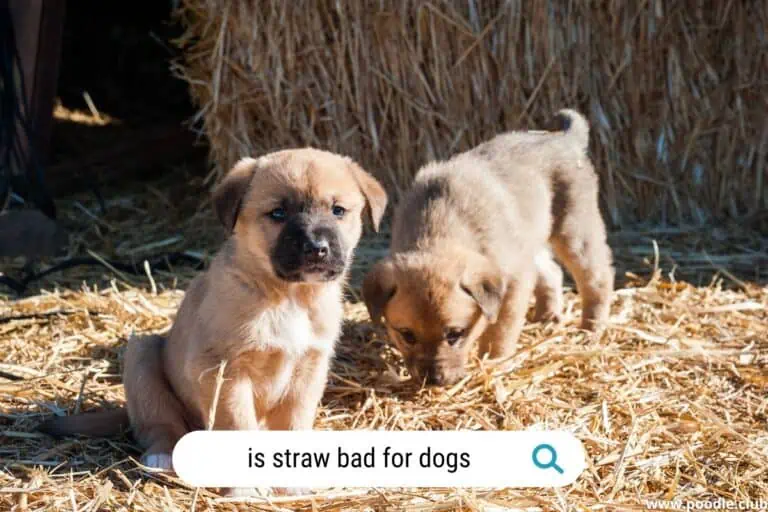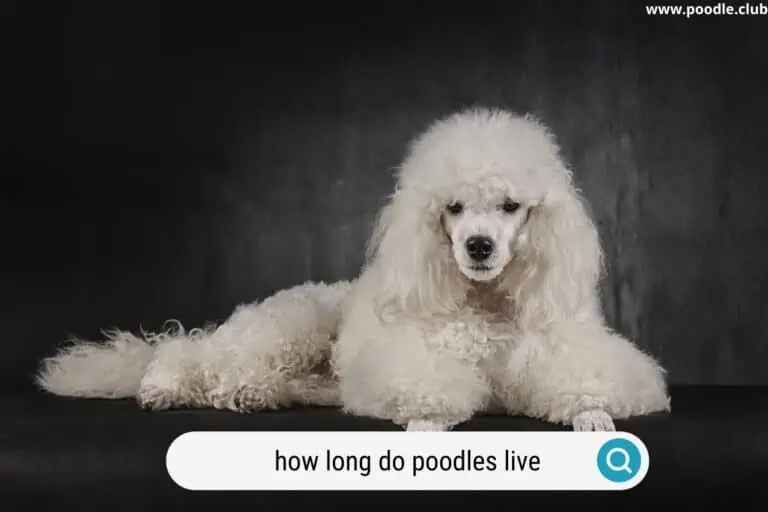Poodle Teething Age (Puppy Teething Guide)
New puppies are a joy to have. They are cute, full of energy, and love to explore the world around them. This Poodle teething age (Puppy Teething Guide) will cover many details about this critical stage of your new pet’s development stages, so you are prepared.
Much of a puppy’s acclimation comes from their senses, including sight, hearing, smell, and taste. Their enhanced smelling capabilities and desire to mouth all the new objects they find can be a disastrous combination for pet owners who find their Poodle chewing up items in the home.
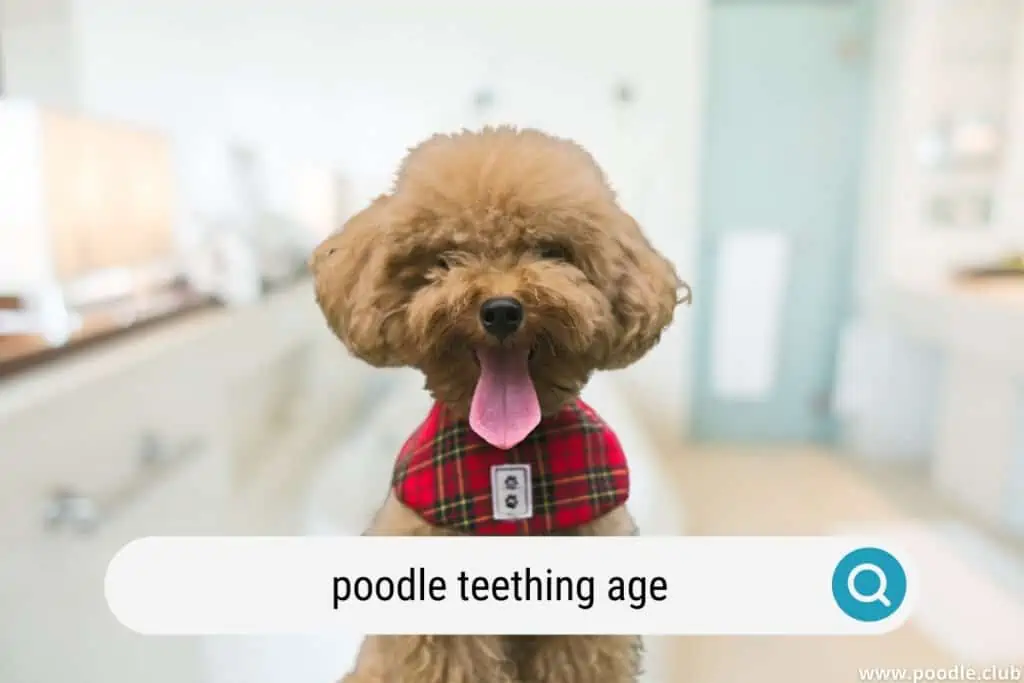
When you throw in the Poodle’s teething age in the mix, there is nothing off-limits to these fun-loving but destructive fur balls.
Expecting a LOT of puppy teething chewing battles!
When Do Poodles Have Their Teething Stage?
Although each Poodle is unique and will develop at its own rate, the general teething stage of this dog breed falls between 4 weeks and 8 months of age. During this time, your pet will undergo several changes in their teeth as they grow and mature.
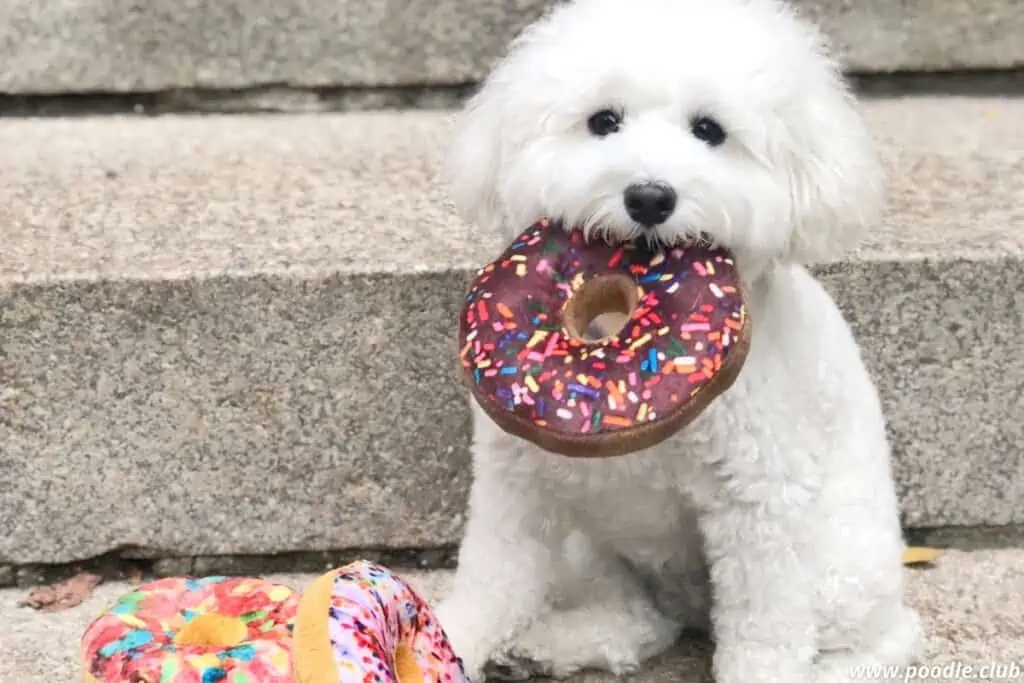
Like human babies, puppies will grow two sets of teeth during their lifetime, the milk teeth and the adult set. However, young Poodles will sport only 28 baby teeth, while adult dogs will have 42 permanent adult teeth.
Here is a detailed breakdown of what your Poodle will face during the entire teething stage:
PuppySpot is a reputable dog marketplace where you can browse and find compatible puppies right from the comfort of your home. They have placed over 200,000 puppies into homes in the US!
| Age | Poodle Teething Stage |
|---|---|
| Puppy Age 2 – 4 Weeks | Baby incisors come in, with 6 on the top and 6 on the bottom |
| Age 5 Weeks | Baby canine teeth come in, with 2 on the top and 2 on the bottom |
| Age 6 Weeks | Baby molars come in, with 6 on the top and 6 on the bottom |
| Age 8 – 10 Weeks: | All baby teeth should be in place |
| Age 2 – 4 Months | Baby teeth begin to fall out as new adult teeth emerge |
| Age 2 – 5 Months | Adult incisors come in, with 6 on the top and 6 on the bottom |
| Age 4 – 6 Months | Adult premolars come in, with 8 on the top and 8 on the bottom |
| Age 4 – 7 Months | Adult molars come in, with 4 on the toop and 6 on the bottom |
| Age 5 – 6 Months | Adult canine teeth come in, with 2 on the top and 2 on the bottom |
| Age 6 – 8 Months | All adult teeth should be apparent |
After careful examination, you can see that the teething process begins only a few weeks after birth and lasts much of their juvenile months without much reprieve. In addition, sometimes, there is overlap between sets of teeth emerging, making the entire process even painful for your puppy.
Thankfully, this stage does not last forever, and soon your new Poodle will have its adult teeth and feel much better.
Each set of teeth has a specific function for your Poodle. For example, depending on the placement and shape, the tooth can be useful for grinding, tearing, or grasping.
Signs That Indicate Your Poodle Puppy is Teething
Because each puppy is individual and will grow at its own rate, not every Poodle will enter the teething stages simultaneously. However, some tell-tale signs can indicate your puppy is teething.
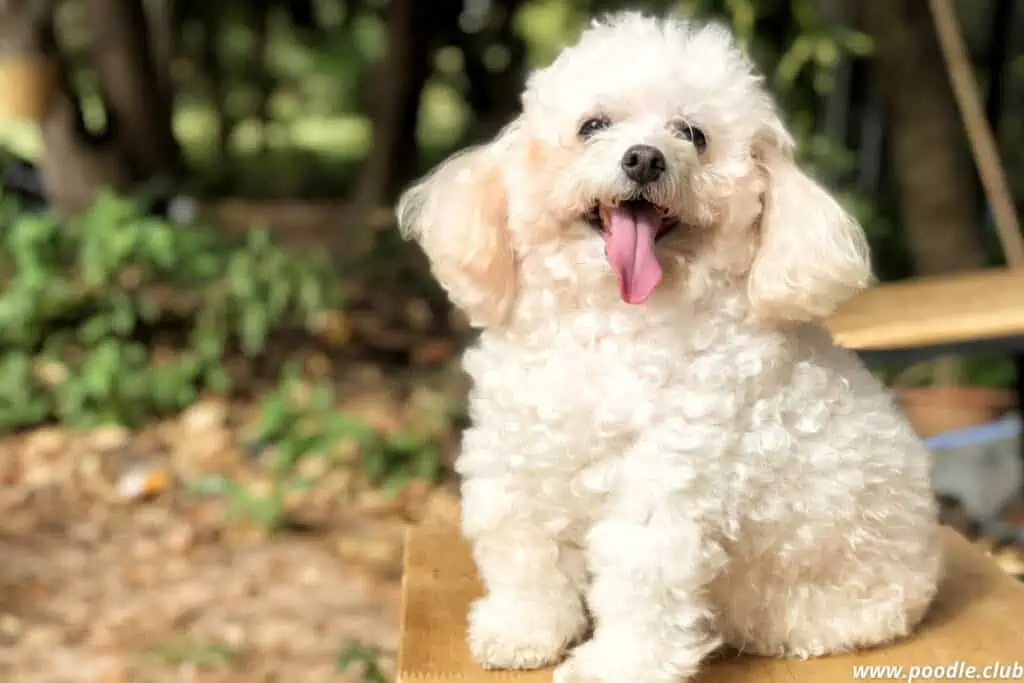
These include:
- Drooling
- Excessive chewing
- Whining
- Red, swollen, or bleeding gums
- Unexpected black gums
- Missing or loose teeth
- Decrease in appetite
- Bad breath
- Mouthing objects or your hands and feet more often
Ideally, if you have a Poodle puppy between the ages of 2 weeks and 8 months, there is a good chance they are teething. Alternatively, not all puppies will show discomfort during this time, and you may not notice much change in your pet’s behavior or eating habits.
How to Help Your Teething Poodle?
There are several ways you can help your Poodle through the difficult teething stage. Since growing new teeth can be uncomfortable, providing them with ways to ease their gums and mouth will make them happier and resist the urge to chew on off-limits items.
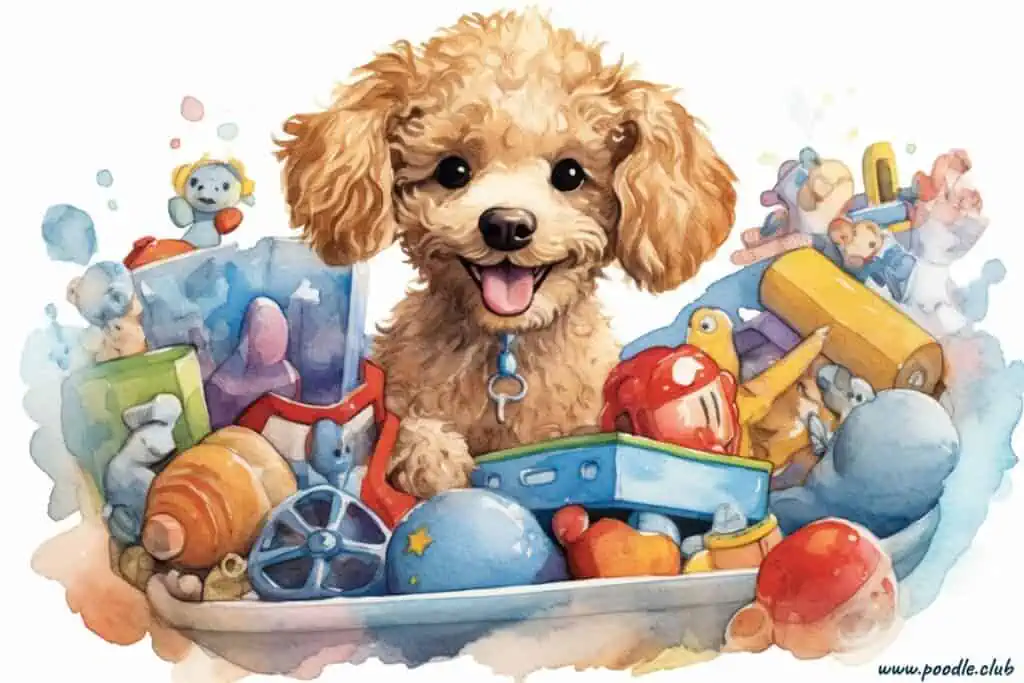
Some of the best ways you can help your pet Poodle as they are teething include:
- Provide a wide variety of chew toys for them.
- Remove off-limit items.
- Use a chew-deterrent spray (like Grannicks Apple).
Provide a Wide Variety of Chew Toys for Them
Puppies are just baby dogs, after all. Their gums can be sore and ache as new teeth come in. Like human babies, puppies will find that actively chewing can help relieve some of this discomfort.
Because puppies enjoy mouthing objects, providing them with a wide variety of chew toys will provide ample relief and help to stimulate their mind as they grow. Select dog toys that are small enough for your Poodle to get in its mouth and include items with knobs, bumps, canvas, rope, and wood for various textures.
The best chew toys for puppies will make noises when compressed, such as squeaking or crinkling sounds, to encourage them to continue chewing on this object rather than your shoes. Some manufacturers also produce scented or flavored chew toys to help entice your new pup to focus on appropriate items for chewing instead of household objects.
Remove Off-Limit Items
Poodle puppies are juvenile dogs with no self-control, especially when exploring the world around them. New pet owners should adopt the concept that they should place anything they do not want to be chewed out of reach.
You want to resist any temptation for your new Poodle to chew on your TV remote or your favorite pair of shoes. Taking away off-limit items will keep your puppy focused on what they can chew on.
Use a Chew-Deterrent Spray
Unfortunately, pet owners cannot hide everything from a new puppy in their home. Sometimes utilizing a chew-deterrent spray from a local pet store can ensure your Poodle does not mouth your furniture or door frame.
Many of these commercial products will taste like bitter apples, and once your pup gets a taste, they will avoid the area.
When Does Chewing Behavior Not Mean Teething?
Occasionally, some puppies will develop a chewing habit and carry it to adulthood. With proper supervision and adequate toys, it should not pose a problem. However, when a Poodle begins to chew up your personal items and is well past the 8-month growth stage, their chewing is probably not from teething.
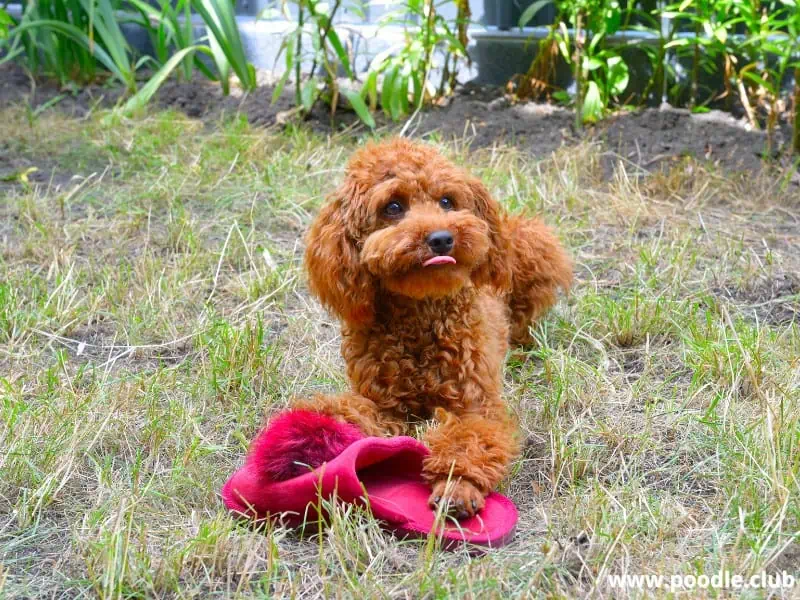
Poodles are highly social animals and love to be with their owners. However, if they are left alone for more extended periods, they can develop separation anxiety. One trait that some dogs exhibit when they have anxiety is excessive chewing.
If you suspect that your Poodle is chewing due to anxiety rather than teething problems, you can consult your local veterinarian or dog behavioral specialist. These professionals can guide you on some alternative steps to take if you must leave your pet at home alone so they do not become destructive.
What if Your Dog is Losing Adult Teeth?
Sometimes an adult dog will lose teeth. There can be several reasons for this, and you should contact your local veterinarian if you notice that your adult Poodle is losing teeth.
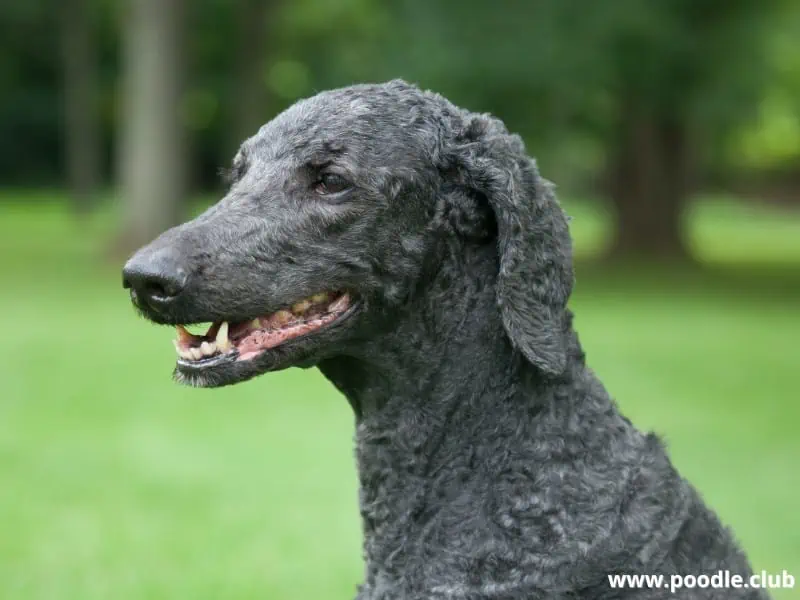
Some of these circumstances for tooth loss include:
- Mouth trauma
- Periodontal disease
- Tooth decay
Mouth Trauma
Dogs can sustain damage to their mouth from chewing bones that are too hard, playing with other dogs, or even falling and banging their jaws. If your dog has any tooth damage, the tooth may appear pink or gray from bleeding in the root of a dead tooth cavity. In some instances, the teeth will fall out, or they may require surgical removal.
Periodontal Disease
Also known as gum disease, advanced periodontal disease can cause an adult dog’s teeth to fall out. Red, inflamed, or bleeding gums are one of this condition’s first indications. Your Poodle may also have bad breath, and you may notice blood spots on their chew toys.
Tooth Decay
Tooth decay is a significant contributing factor to tooth loss in adult dogs. If you do not regularly brush your Poodle’s teeth, there is a higher chance of developing a buildup of plaque and cavities, resulting in decay. Observing a cleaning routine is vital to keep your pet’s teeth healthy as they age.
Sometimes Poodles DON’T lose their baby teeth – and your Vet will need to extract the offending tooth. For an explanation, see this video.
Poodle Teething Age: The Takeaway
Poodle puppies can be a handful as they learn new boundaries and explore their world. In addition, the teething process can complicate their behavior as you teach your new pet what the word no means.
Knowing how long your Poodle puppy will be teething and what you can do to help them will make the process easier for them and you. This stage does end, and before you know it, they will settle into your home nicely and hopefully not chew on anything besides their toys.
Talk to your local veterinarian if you have any concerns about your Poodle’s teeth or the teething process. A professional can assess your pet’s mouth and provide any assistance they may need with their oral health. This way, you can ensure that your dog’s teeth and mouth are healthy and seek care as soon as possible in any situation where they may need help.
